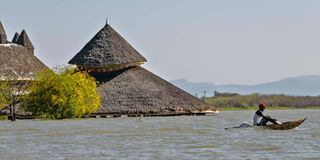Covid-19 deaths, confusion and climate change

A local fisherman paddles a traditional raft made from reeds past one of the submerged buildings of the Soi Lodge on the shores of Lake Baringo on October 6, 2020.
What you need to know:
- Many a flower and vegetable garden must have been created during the social lockdown.
Ethanol spills can pollute surface water while isopropyl will toxify soil and water- surface and underground.
Covid-19 initially posed as an environmental rescuer, stopping humanity in its usual mode of destruction and climate change instigation.
The social distancing, reduced partying and parties, curtailed mobility, wearing of face masks, and the thinning of the usually teeming world transport sector — all seemed to help the natural environment exhale.
In a way, Covid-19 gave the environment a break from human oppression and tweaking. Unfortunately, it has changed the life of an entire planet by causing death, economic loss, family break-ups, psychological problems and super confusion among its vile impacts.
As scientific research will soon unearth how Covid-19 may have reversed the effects of global warming by a trifling margin, as greenhouse gases (CHGs), mostly from the transport sector and industries, doubled.
With countable cars on the road, decreased number of sea and air vessels together with decreased industrial activity, nitrogen oxides, carbon dioxide and sulphur dioxide emissions also fall and this lowers the amounts of CHGs in the atmosphere- hence slighter global warming.
With Covid-19, greening of the earth was amplified as people temporarily neglected their farms and allowed for weeds and shrubs to thrive. Forests were also spared the axe and a variety of plants were grown for pastime.
Many a flower and vegetable garden must have been created during the social lockdown. An extended tree cover on the earth’s surface translates to more carbon sinking by trees and more release of oxygen into the environment. It also means more evapotranspiration and more rain. Probably this is the reason Kenya has received so much rain in 2020.
Terrestrial radiation
Dust into the atmosphere was also minimised as fewer people walked around and construction activities were halted. This thins the blanket of dust that would accumulate in the atmosphere to block terrestrial radiation from escaping the earth.
Despite the respite that Covid-19 has given the environment, it is still detrimental to both the natural and human environment. It has killed many people and increased the use of detergents and sanitisers.
There is certainly an increase in global water use, which leads to overproduction of wastewater. In Africa, where water treatment is poorly developed, much of the handwashing water will mostly end up in an ordinary wastewater drainage and into a natural water body, where it will vitalise eutrophication (too much nutrients in water bodies.)
In a few months or years, the phosphate-rich handwashing water (loaded with detergents) will cause algal/weed bloom in many freshwater bodies. Water weeds deplete water oxygen and pose an existential risk to aquatic animals.
Dead aquatic organisms will raise the levels of CHGs s in the atmosphere afresh and recharge global warming. Most of the hand sanitisers are alcohol-based, mostly ethanol and isopropyl. Ethanol spills can pollute surface water while isopropyl will toxify soil and water- surface and underground.
Wearing of face masks is more advantageous to humans and less beneficial to biodiversity. It has kept down the spread of TB, flu, and other airborne diseases.
As far as climate is concerned, wearing of face masks enhances the release of hot air into the environment, besides augmenting human exhaled carbon dioxide.
This will upturn global temperatures. Covid-19 may have paused climate change, but if it continues scourging humanity, more global warming and environmental destruction should be expected.





